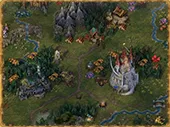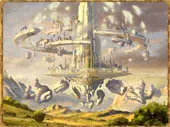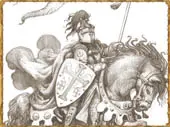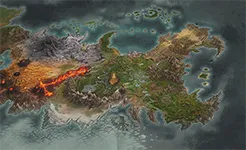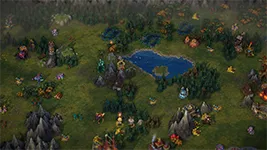上古纪元#开发日志3#Lore
来源:https://store.steampowered.com/news/app/3105440/view/4547038620956712937
制作组知道老英雄无敌(英雄无敌1-3,魔法门6-8)一直有科幻背景,也知道有的粉丝喜欢科幻背景,有的则不喜欢(比如H3铸造族的取消)。对此,制作组的看法是搁置争议,模糊叙事。具体操作上,本代的所有叙事都采用游戏内人物叙事,包括兵种介绍、背景设定等等,都是基于世界观下人物的认知角度进行的。因此这些叙事并非完全真实可信,叙事者本人可能受到错误信息的引导,其背后的真实留给粉丝自己。
原文
Franchises require a very special approach to lore when you’re not the original creator. As a fan, you want to add something to the world you love that is faithful to its spirit, but meaningful enough so that it doesn’t feel like gushing fanfiction. This becomes even harder if a franchise is old (like Might and Magic) and has a complicated history (like Might and Magic).
Heroes of Might and Magic as a series is a spin-off of the Might and Magic franchise and partially shares a world (MM6-MM8) with it — up until HoMM3, that is. Then an eschatological event happens, and HoMM4 takes place in a new world, as do the following games. Some inhabitants of the original Enroth escape to Axeoth from HoMM4, but HoMM5 is, in terms of grand cosmology, a kind of pure fantasy soft reboot of the setting in the world of Ashan.
It is, of course, irrelevant to us as HoMM:OE is a return to Enroth. But the soft reboot happened for a reason. And that reason was, the HoMM community is very… split on the franchise’s origins.
Are Demons Space Aliens?
This is because the Might and Magic universe isn’t fantasy — it’s space techno fantasy
about powerful high-tech races and ancient creatures terraforming a world that only looks medieval. The Might and Magic series explores this in full detail, but the Heroes
of Might and Magic sub-franchise conceals this aspect. Of course, it’s not like the original creators considered HoMM to be separate from MM lore-wise — quite the contrary. But the fact remains, in all of the Heroes games the sci-fi aspect was never ever made explicit. You wouldn’t know that the devil Kreegans from Inferno are actually a race of spacefaring aliens (a few hints in the campaigns notwithstanding), unless you search external sources, like the Might and Magic games or Internet sites, for this information. So a lot of players fell in love with Heroes without knowing about its roots.
Naturally, this split the community. Some people enjoy the techno fantasy aspect. Others treat it as a sort of easter egg! But there are also people who heavily dislike the “techno” part — they rebelled against the original (unreleased) Forge faction in HoMM3, which was meant to represent this more technological aspect. A significant portion of the Heroes
of Might and Magic fans view it as pure fantasy. Which is one of the reasons the series moved to more traditional worlds in later installments.
Now, dear reader, we suspect you have an opinion on the matter, whether pro- or anti-techno element. Since the announcement we’ve read a lot of passionate discussions on the matter, with mutually exclusive points made from both sides. To some people, removing the techno fantasy aspect is removing the DNA of the series; to others, adding it dilutes the Heroes identity and makes the world less immersive.
Since we at Unfrozen are fans, our team is actually also split on the matter — some people enjoy the techno fantasy roots, others don't. And so the question is: how do we create a game that makes everyone happy? Is it even possible?
Here Come the Tropes
Here’s a fun question for you: who writes unit or item descriptions in a game? More often than not, a sort of omniscient narrator/demiurg figure does — basically it’s the creators of the game saying, “This is the objective truth.” Games like Magic: The Gathering shift this tradition, utilizing in-universe quotes from characters for their flavor texts. And some games, like Hollow Knight, go even further — their artbook is presented as a bestiary written by an in-universe character who has a name and a story (and who can thus be mistaken — or at least has a clearly subjective view of the world).
The cool thing about Heroes of Might and Magic is that it’s a game about clashing worldviews. Factions are different on every level, from visual design to gameplay perks, and we emphasize that in Olden Era. So why not make their worldviews equally varied?
Different people of Jadame may have different ideas on where magic comes from. Or how the world began. Or whether gods exist and what they do. Or what the movement of stars means. Instead of giving a definitive answer, why not use conflicting interpretations to our advantage?
Subjective Narration
In Olden Era, followers of the Temple believe that the Sun is a magic chalice where all good souls go after death. This is why they preach self-improvement: the better you make yourself in life, the stronger your soul becomes, feeding their central object of worship. This is also why templars hate necromancers so much, as they tie souls to mortal remains in an unnatural way, denying them this bliss and obligation.
Now, is the Sun actually a chalice? Do faithful souls really go there?
Do we need an objective answer?
From Rashomon to A Song of Ice and Fire, stories with multiple narrators, subjective and unreliable, have been a great way to show conflict where each side has their own truth and no one feels like an123 objective villain. To an Alvar dark elf, the conflict between Temple and Necropolis might look ridiculous because they know that the sun is just an orb of fire in the sky. To a Murmurwood satyr, it makes sense, as they are equally convinced that all souls are sucked back into the world after death, but the Temple’s desire to inflate them artificially feels unnatural. No one is “objectively” right or wrong here, it’s just different worldviews clashing — over things more fundamental than a piece of land or a powerful artifact.
We will, of course, mostly explore this in the campaign. But even in skirmishes or on the Arena, this trace of subjectivity is still present. All unit descriptions, for example, are written by an in-universe character, a scholar, who does his best to be impassive, but still comments on aspects of other cultures he finds questionable, and he can still be wrong.
And yes, it’s an old minotaur
In fact, New World Computing sometimes made good use of the “unreliable narrator” tropes. For instance, some people in Enroth think that VARN was a seafaring ship, or the whole deal with Kreegans being labeled as “devils” and their enslaved humans as possessed Demoniacs.
All that said, there are aspects of HoMM:OE’s world that aren’t open to interpretation — like Jadame’s people, their social structures and politics. Or pure geography.
WIP! Subject to change! And all that! Still, here’s how our version of Jadame looks right now
The largest volcano on Jadame is in Shadowspire, but it’s dormant. The ones to the south are active. These are undeniable facts. But it’s not necessarily possible to tell whether that was the cause of the new fiery power appearing in those parts of the continent (attracted and bolstered by the elemental force of the volcanoes, maybe?) or if the power boosted the volcanoes. Were the Wasp Nest insectoid inhabitants corrupted by this new force — or did they summon it voluntarily?
Some of these questions will be answered in the story. But others will remain open-ended. Because everyone has their own truth.
机翻
如果您不是原创者,那么特许经营需要采用非常特殊的方法来讲述传说。作为粉丝,您希望为自己喜爱的世界添加一些忠于其精神的东西,但又要足够有意义,这样它才不会让人觉得是滔滔不绝的同人小说。如果特许经营历史悠久(如魔法门),历史复杂(如魔法门),那么这会变得更加困难。
《魔法门英雄传》系列是魔法门系列的衍生作品,部分与魔法门系列共享一个世界(MM6-MM8)——直到《魔法门英雄传 3》。然后发生了末世事件,《魔法门英雄传 4》发生在一个新世界中,之后的游戏也是如此。一些原始 Enroth 的居民从《魔法门英雄传 4》逃到了 Axeoth,但从宏大的宇宙学角度来看,《魔法门英雄传 5》是 Ashan 世界场景的一种纯幻想软重启。
当然,这与我们无关,因为《魔法门英雄传:OE》是 Enroth 的回归。但软重启是有原因的。原因是,《英雄无敌》社区对这个系列的起源非常……分歧。
机恶魔是外星人吗?
这是因为《魔法门》宇宙不是幻想——它是太空技术幻想
关于强大的高科技种族和古代生物改造一个看起来只有中世纪的世界。《魔法门》系列详细探讨了这一点,但《魔法门之英雄无敌》子系列隐藏了这一方面。当然,最初的创作者并不认为《英雄无敌》在传说方面与《魔法门之英雄无敌》是分开的——恰恰相反。但事实是,在所有《英雄无敌》游戏中,科幻方面从未明确说明过。你不会知道《地狱》中的恶魔克里根实际上是一个太空外星人种族(尽管在战役中有一些暗示),除非你从外部来源(如《魔法门》游戏或互联网网站)搜索这些信息。因此,很多玩家爱上了《英雄无敌》,却不知道它的根源。
这自然分裂了社区。有些人喜欢科技幻想方面。其他人则把它当作一种复活节彩蛋!但也有人非常不喜欢“科技”部分——他们反抗《英雄无敌 3》中最初的(未发布的) Forge 派系,该派系本应代表这种更具科技性的方面。《英雄无敌》粉丝中有相当一部分将其视为纯粹的幻想。这也是该系列在后续作品中转向更传统世界的原因之一。
现在,亲爱的读者,我们怀疑您对此事有自己的看法,无论是支持还是反对科技元素。自发布以来,我们已经阅读了很多关于此事的热烈讨论,双方的观点相互排斥。对某些人来说,删除科技幻想方面就是删除该系列的 DNA;对其他人来说,添加它会削弱《英雄无敌》的身份,让世界变得不那么身临其境。
由于Unfrozen的粉丝们都很喜欢这款游戏,因此我们的团队在这个问题上也存在分歧——有些人喜欢科技幻想的根源,有些人不喜欢。所以问题是:我们如何制作一款让每个人都满意的游戏?这有可能吗?
比喻来了?
这里有有趣的问题:谁在游戏中撰写单位或物品描述?通常,由一种无所不知的叙述者/造物主来撰写——基本上是游戏的创造者说,“这是客观事实。”《万智牌:聚会》等游戏改变了这一传统,利用角色在游戏中的名言作为他们的风味文本。而有些游戏,如《空洞骑士》,走得更远——他们的艺术书以动物寓言的形式呈现,由一个有名字和故事的游戏中角色撰写(因此可能会被误解——或者至少对世界有明显的主观看法)。
《魔法门之英雄无敌》的酷之处在于它是一款关于冲突世界观的游戏。从视觉设计到游戏优势,各个派系在各个层面上都有所不同,我们在 Olden Era 中强调了这一点。那么为什么不让他们的世界观同样多样化呢?
Jadame 的不同人可能对魔法的来源有不同的看法。或者世界是如何开始的。或者神是否存在以及他们做什么。或者星星的运动意味着什么。与其给出一个明确的答案,为什么不利用相互矛盾的解释来为我们谋利呢?
主观叙述
在 Olden Era 中,圣殿的追随者相信太阳是一个魔法圣杯,所有善良的灵魂死后都会去那里。这就是他们宣扬自我完善的原因:你在生活中表现得越好,你的灵魂就会变得越强大,从而滋养他们崇拜的中心对象。这也是为什么圣殿骑士如此憎恨死灵法师的原因,因为他们以一种不自然的方式将灵魂与凡人的遗体联系起来,剥夺了他们的这种幸福和义务。
那么,太阳真的是圣杯吗?忠实的灵魂真的会去那里吗?
我们是否需要一个客观的答案?
从《罗生门》到《冰与火之歌》,故事中多位叙述者,主观且不可靠,是展示冲突的绝佳方式,每一方都有自己的真相,没有人感觉自己是客观的反派。对于阿尔瓦黑暗精灵来说,神殿和墓地之间的冲突可能看起来很荒谬,因为他们知道太阳只是天空中的一个火球。对于 Murmurwood 萨蒂尔来说,这是有道理的,因为他们同样相信所有灵魂死后都会被吸回世界,但神殿想要人为地膨胀灵魂的想法让人感觉不自然。这里没有人“客观”地正确或错误,只是不同的世界观在发生冲突——关于比一块土地或一件强大的神器更基本的东西。
当然,我们将主要在战役中探索这一点。但即使在小规模冲突或竞技场中,这种主观性的痕迹仍然存在。例如,所有单位描述都是由一个宇宙中的角色——一个学者——撰写的,他尽力保持冷静,但仍然会评论他认为有疑问的其他文化的方面,他仍然可能是错的。
事实上,新世界计算有时很好地利用了“不可靠的叙述者”的比喻。例如,Enroth 的一些人认为 VARN 是一艘航海船,或者 Kreegans 被贴上“魔鬼”的标签,而他们奴役的人类则是被附身的恶魔。
话虽如此,HoMM:OE 的世界有些方面是无法解释的——比如 Jadame 的人民、他们的社会结构和政治。或者纯粹的地理。
WIP!可能会更改!还有所有这些!不过,我们目前的 Jadame 版本是这样的
Jadame 上最大的火山位于 Shadowspire,但它处于休眠状态。南部的火山活跃。这些都是不可否认的事实。但不一定能判断这是否是大陆这些地区出现新的火力的原因(可能是被火山的元素力量吸引和增强了?)还是这种力量增强了火山。黄蜂巢里的昆虫居民是否被这种新力量腐蚀了——还是他们自愿召唤了它?
其中一些问题将在故事中得到解答。但其他问题仍将悬而未决。因为每个人都有自己的真相。
